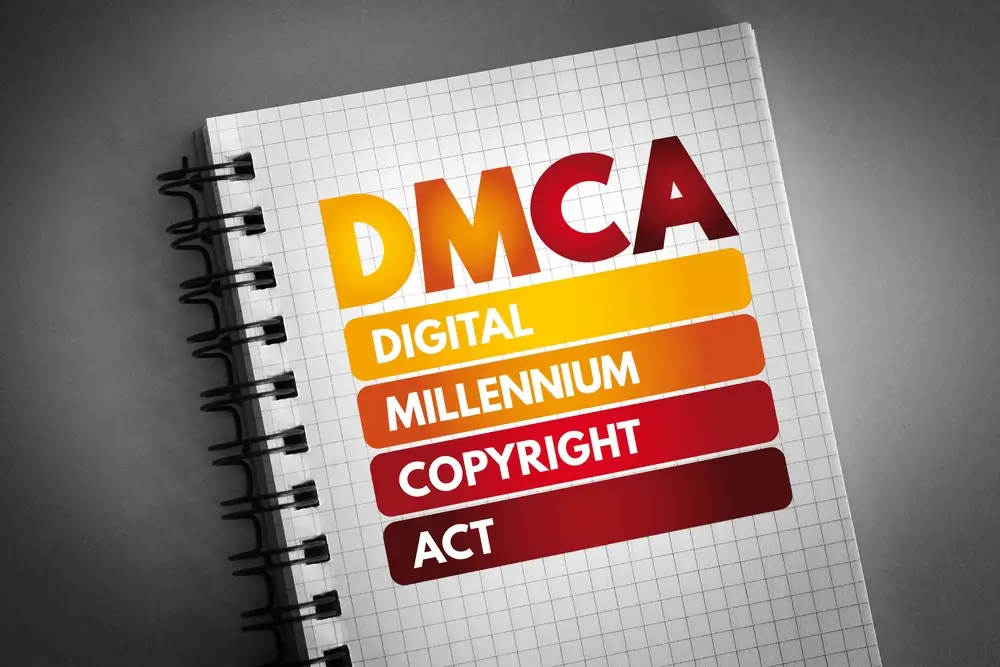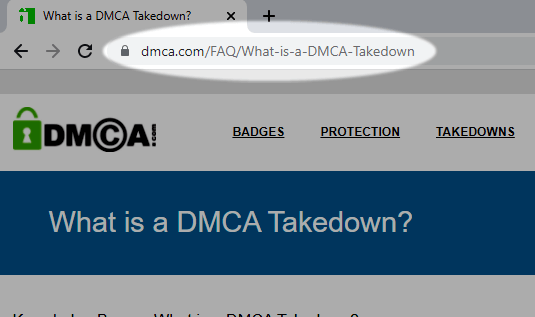
DMCA Policy refers to D.M.C.A. This stands for Digital Millennium Copyright Act which is a U.S. copyright law. It addresses the rights and obligations of owners of copyrighted material who believe their rights under U.S. copyright law have been infringed, particularly but not limited to, on the Internet.
DMCA specifically addresses the rights and obligations of OSP / ISP (Internet Service Providers) on whose servers or networks the infringing material may be found.
If your content has been stolen to get started you can submit a takedown request here: Start Your Takedown
Note:
Even though DMCA is copyright law in the USA our service is NOT exclusive to the US only. DMCA.com has worked with webhosting or internet copyright or Intellectual Property Copyright processes within most countries throughout the world. Our takedown contacts are in all the major hosting countries.
DMCA.com Fast Tip
Any owner of content has the right to process a takedown notice for removal of their content from an infringing website if the content owner's property is found online without their permission.
How does DMCA work?
Protecting creative content and intellectual property on the internet has become increasingly important. One essential tool that website owners and content creators can utilize is the DMCA policy. The Digital Millennium Copyright Act (DMCA) is a crucial legislation in the United States that empowers individuals and organizations to combat copyright infringement online.
Can I add a policy to my website?
A website can protect itself under the DMCA by implementing a DMCA policy. This policy should include instructions on how to report alleged infringement, how the website will respond to such reports, and information on how to file a counter-notice.
DMCA.com's first recommendation is to contact a lawyer or law firm in the legal jurisdiction of your company or website to determine what is the appropriate legal communication. DMCA.com does not offer any legal advice or specific recommendation regarding any copyright practice.
DMCA.com has two programs to help content creators, publishers and UGC platforms:
- Content Publishers or Platforms of User Generated Content (UGC) should use the DMCA Compliance program - Get Compliant - adding a compliance badge to your site instantly takes the guess work and time out of processing DMCA Takedown notices on your site.
- Content Creators and Publishers (without UGC) should use DMCA.com Protection Pro - Content Protection - it is essential to add an ownership statement to all your content. Registering and adding your content and website to this program is click through easy. There is even a Free program so getting started is easy.
If you are unsure what program is best for your situation by all means reach out and one of the DMCA.com team can provide support: Help Me Choose the right option.
How can I know if a website has a DMCA policy?
If a website uses the DMCA they will usually place a reference in the footer of the website. The clickthrough should clearly state the conditions of the DMCA Takedown process. Many websites reference the DMCA.com Takedown Notice form on this website directly. If you are unsure or the website unclear, click here to complete your takedown request: DMCA Takedown Form. Our professional team will connect your takedown request to the right website.
Who is authorized to act on behalf of copyright owners?
DMCA.com specializes in content removal and can help you get your stolen content taken down. Start Your Takedown
Upon discovering a potential copyright infringement, the DMCA policy provides a structured procedure to address the issue. The copyright owner or their designated agent must send a formal DMCA takedown notice, to the website hosting the alleged infringing content. This notice typically includes the following elements:
- A statement, made under penalty of perjury, that the complaining party is the copyright owner or authorized to act on their behalf.
- Identification of the copyrighted work being infringed.
- Sufficient information to locate the alleged infringing material.
- The complaining party's contact information.
- A statement affirming good faith belief that the use of the copyrighted material is not authorized.
Upon receipt of a valid takedown notice, the website operator must act promptly to remove or disable access to the infringing material. This process ensures that copyrighted works are adequately protected, and that appropriate action is taken against potential infringers.
DMCA.com Testimonial
DMCA was fantastic to work with, they were very professional, provided me with all the information and updates necessary to have personal content removed from a website. It was impressive at how quick they respond to messages and how fast they can complete a take-down . The pricing is very reasonable and the service is outstanding. I would highly recommend their services and would definitely use them again. Thank you Julie and Diane and everyone at DMCA. -SH
Who can file a DMCA Takedown Notice?
- content publishers or distributors (with permission of the content or copyright owners)
- NFT owners
- social media users and participants
- content creators/owners
- copyright owners
- code writers and publishers
- subject contained within the content and published without permission (special considerations may be required)
If the list above does not appear to describe your situation by all means ask. Click here to Ask us about your situation
What is needed as proof?
Three main pieces of information are needed to get started filing a DMCA Takedown Notice:
1. Infringing URL

Where on the internet (or platform like Facebook or TikTok) is your stolen content located? What is the link that you want the content removed from? Be sure to provide the URL or website/webpage link of the content you want removed. If the stolen content is an image or video located on a website provide the direct link of the content contained in the site. Copy and paste the infringing text, or provide the URL of the infringing image if required.
An example link would look like: https://www.badguy_site.com/webpage/image_2

2. Source URL
Where was your content located when it was stolen? Was it on you social media profile like Facebook or Reddit? Was it from your own website? Provide the exact URL where it was stolen from, even if the content has already been removed from it's original location. The original URL is still valuable to the notice. If it was not online you can reference cell phone, computer, or camera etc. If it was online such as a website or cloud storage provide the link to the exact page it was stolen from. You can upload the original content to a cloud storage service and provide that URL with an expalanation of where it was originally stolen from.
An example link would look like: https://share.icloud.com/photos/my_original_content
3. Description of Ownership

What is the content owner's name and how was the content stolen? How is this content yours? How do you own it? Did you create it, buy it, copyright it? Who is claiming ownership of the content? Who is authorized to file the DMCA Takedown? When did you create the content and when was the content stolen?
An example description would sound like: "My photo I took of myself on my camera was stolen from my Google Drive and was posted on this website without my knowledge and I would like it removed."
If you are unsure how to collect the information for these three categories the Professional Takedown Team at DMCA.com can help with the answers. Click here to ask us about your situation.
Resolving disputes
To maintain a fair and balanced system, the DMCA policy also includes provisions for counter notices. If the alleged infringer believes that the takedown notice was issued in error or in misinterpretation of the law, they can file a counter notice. Similar to the takedown notice, the counter notice must include specific information, such as the alleged infringer's contact details and a statement of good faith belief that the material was wrongly removed.
Upon receipt of a valid counter notice, the copyright owner or designated agent has a limited period to respond. If no further legal action is taken by the copyright owner within this timeframe, the website operator may restore the removed material. However, if the copyright owner chooses to pursue a legal remedy, the parties involved must resort to the appropriate legal channels to resolve the dispute.
For more information you can visit: http://www.copyright.gov/legislation/dmca.pdf
Related DMCA Takedown FAQ's
- What s DMCA Protection
- DMCA Takedowns
- Who is authorized to send a DMCA Takedown notice
- Will a DMCA-Takedown work in other countries
- Why use DMCAcom for your Takedowns
- What is a DMCA Counter Notice